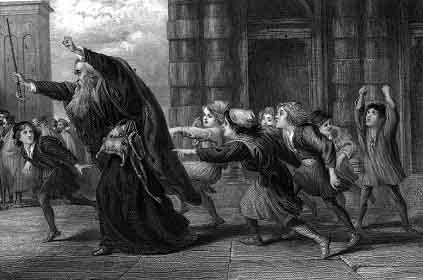
The ‘Splainer (as in “You’ve got some ‘splaining to do”) is an occasional online feature in which Kimberly Winston and other RNS staff give you everything you need to know about current events to hold your own at a cocktail party.
(RNS) Hours after two Palestinians, armed with guns and hatchets, killed four Jewish worshippers and a Druze police officer at a Jerusalem synagogue Tuesday (Nov. 18), Israeli Prime Minister Benjamin Netanyahu called the attack a “blood libel.” Why, and what did he mean?
Whose blood are we talking about?
A “blood libel” refers to the centuries-old canard that Jews kill Christian children and use their blood to make matzo, the unleavened bread that Jews eat during Passover. Jews have also been accused of other fictions, among them: desecration of the Communion wafer and the ritual crucifixion of Christian children.
During the Middle Ages, the death of a Christian child was often blamed on Jews. Sometimes one Jew would be murdered in “retaliation”; sometimes an entire Jewish community. The scenario became known as a “blood libel.”
Where did this “blood libel” come from?
Christians likely rooted it in a misinterpretation of the Gospel of Matthew 27:25, which has the Jewish people taking the blame for the death of Jesus in perpetuity: “Then the people as a whole answered, ‘His blood be on us and on our children.'”
Mary C. Boys, academic dean of Union Theological Seminary and an expert on Jewish-Christian relations, said one of the earliest historical accounts of blood libel is from 1235, in the town of Fulda in what is now Germany, where Christians accused Jews of killing two boys and retaliated by murdering 34 Jews.
Plagues, crusades, economic upheaval and other uncertainty spurred the spread of the blood libel throughout the Middle Ages. Jews became “not simply historic enemies who had put Jesus to death, but a live threat to society,” said Boys.
But if blood libel describes Christian-on-Jewish violence, why use it to describe the murder of Jews by Muslims?
Netanyahu was trying to make the point that the violence at the synagogue took the lives of Jews for a crime they did not commit. He referred to the widespread belief among Palestinians living in Gaza and the Israeli-occupied West Bank that Palestinian bus driver Yousef al-Ramouni, found hanged in his Jerusalem bus Sunday, had been murdered by Jews.
The autopsy report by Israeli authorities found that it was a suicide, and a Palestinian doctor in attendance was said to concur. But many Palestinians instead believe a rumor that he had been killed by Israeli extremists and that the Palestinian doctor found signs of foul play.
“The operation in Jerusalem is a response to the murder of the martyr Yousef Ramouni and to the series of crimes by the occupier at Al-Aqsa, and Hamas calls to continue these operations,” said Hamas spokesman Sami Abu Zuhri.
Does the libel label fit in this case?
“It absolutely fits,” said Rabbi Abraham Cooper of the Simon Wiesenthal Center, one of the pre-eminent organizations committed to fighting anti-Semitism and other bigotry. “A Palestinian man commits suicide. The lie of murder by Jews is launched and then multiplied by social networking that then inspires more violence.”
Others see the blood libel as an anachronism. The label refers to a time when Jews lived in Europe as a persecuted minority within a predominantly Christian majority. But in Israel, Jews are a majority living among a beleaguered Palestinian minority.

Shylock After the Trial, describing Act II, Scene vii of William Shakespeare’s play ‘The Merchant of Venice.’
Where does Shakespeare come into this?
Literature is replete with Jewish villains, steeped in stereotypes and linked to blood libels. Shakespeare is no exception. In “The Merchant of Venice,” the character of Shylock is a greedy Jewish moneylender. When Shylock demands a “pound of flesh” for failure to pay back a loan, the heroine, Portia, refers to the widespread blood libel against Jews:
“Take then thy bond, take thou thy pound of flesh;
But, in the cutting it, if thou dost shed
One drop of Christian blood, thy lands and goods
Are, by the laws of Venice, confiscate
Unto the state of Venice.”
YS/MG END MARKOE




